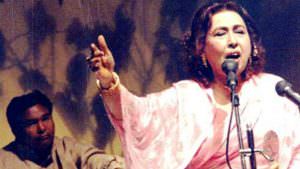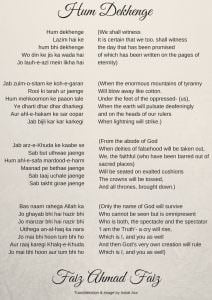Iqbal Bano was an Indian-born, highly acclaimed, Pakistani Ghazal singer. She is best remembered for taking on general Zia-ul-Haq, the general responsible for the hanging of Pakistan’s chosen leader Zulfikar Ali Bhutto. Iqbal Bano is known as the epitome of defiance and revolution. She is one of the few singers who amalgamated traditionalism with modernism by adding her voice to the revolutionary poet Faiz Ahmed Faiz’s verses as early as 1960’s.

Source: Youtube
Early Life
Born in New Delhi on 27th of August in 1935, Iqbal Bano traced her origins to Rohtak, Haryana. She made Pakistan her home later in life after being married. Due to her strong spirit and the revolution in her blood, she had had a cult following in the country, influencing them with Faiz Ahmad Faiz’s poems of fiery spirit and ‘disobedience’. She was best known for her semi-classical Urdu ghazal songs and classical thumris, but also sang easy-listening numbers in the 1950s films.
Bano had developed a love for music at a very young age. Bano’s friend’s father recognized this early and pursued Bano’s father to teach her music. “My daughters do sing reasonably well, but Iqbal Bano is especially blessed in singing. She will become a big name if you begin her training.”
Education
In Delhi, she studied under Ustad Chand Khan, who was an expert in all kinds of classical forms of vocal music. She was instructed in pure classical music and light classical music within the framework of classical forms of thumri and dadra.
Career
Ustad Chaand Khan referred her to All India Radio, Delhi, where she sang on the radio. In 1952, at the age of seventeen, she was married into a Pakistani family. She moved to Multan with her husband who promised her that he would never try to stop her from singing, but would rather encourage and promote her, which he did.
She had become a star by the 1950s – singing not just ghazals, but also soundtrack songs for famous Pakistani Urdu films like Gumnaam (1954), Qatil (1955), Inteqaam (1955), Sarfarosh (1956), Ishq-e-Laila (1957), and Nagin (1959).
She had gotten so popular amongst the Afghanis with her songs in Farsi that she was called to attend the Jash-e-Kabul in Afghanistan once a year. It is said that on one such occasion King Zahir Shah, during the jashn (celebration) was so moved by her singing that he presented her with a gold vase right after she finished singing.
Spirit of Revolution
Faiz Ahmad Faiz wrote revolutionary nazms, but it was Iqbal Bano who made them eternal.
A little insight into the Pakistani setting during the 1980s is of utmost significance to understand Bano’s struggle and strength. In 1977, General Zia-Ul-Haq took charge of Pakistan by disposing Prime Minister Zulfikar Ali Bhutto. He declared himself the president of Pakistan in the September of 1978. With time, Zia’s dictatorship took an increasingly religious turn, since he had explored the scope of playing what we can call (in popular lingo) the ‘Islam card’ in Pakistan during that time. He had exploited this privilege in order to retain, and strengthen his power in the country, and to establish a rulebook that was to be derived from his own understanding of religion, and of course, biased against women.

Source: Yuva Revolution
It was the result of the support he got from the citizens of Pakistan that he was able to implement a series of policies that reflected his personal beliefs and his understanding of religion, through which he created his very own version of Islam, ready to be universalized. In the year of 1985, Zia’s forced repressive Islamicization took a form of telling women, through law, what they were to wear & what not to wear.
It was an attack on the free will of women, which was, is, and will remain a God given gift to all of us humans, which is what makes us ‘ashraful-mukhalaqat’ (Supreme beings), after all. Or at least this is what has been established in the Holy Quran. Muslims are given a free will, a right to choose between good & evil, so that God can hold people accountable for their actions. But alas, Zia didn’t quite understand this, and was imposing his version of religion on an entire nation.
Also Read: Amrita Pritam: Not Just A Poet, But Revolution Personified
Free will has been celebrated by various poets such as Iqbal in one of his shairs,
“Khudi ko kar buland itna ki har taqdeer se pehle,
Khuda bande se khud pooche bata teri raza kya hai.”
(Make yourself such a strong devotee that before writing down your destiny,
God himself asks what you desire.)
As a consequence of this staunchness, the saree, which was part of the cultural & traditional attire owing to its Indian roots, suffered. It was banned in Pakistan. In the same year, Iqbal Bano, who was by then one of Pakistan’s most famous & loved singers, came out to resist this forced religiosity.
She came up with an act of beautiful defiance, where she sung a revolutionary nazm (free verse) called ‘Hum Dekhenge‘, by Faiz Ahmed Faiz to an audience of nearly 50,000 people in a stadium of Lahore, wearing the very clothing that was banned, – a beautiful black sari – despite the poet’s works being banned by General Zia ul-Haq’s military regime on the grounds of his close ties with Zulfiqar Ali Bhutto.
Hum Dekhenge, within no time, became a battle cry, a slogan. Through her songs she educated the illiterate and bound them together for a greater cause.
She suffered various consequences for her action. She was banned from officially singing at concerts and appearing on the television. Despite this, people were buying her tapes on the black market and her fan following only increased with time. With this one song, she had formed a cult following who would go to the extent of buying her music in black. Bano, with only her voice and spirit, shook lakhs of people with this single act.
Hum Dekhenge – The Song Of Defiance (with transliteration)

Iqbal Bano with poet Faiz Ahmed Faiz | Source: universalpoetries
‘Hum Dekhenge’ (We shall witness) is a revolutionary nazm, which was written in 1979 by Faiz Ahmad Faiz, in response to General Zia ul Haq’s repressive dictatorship and a critical commentary of Zia’s brand of authoritarian Islam. Faiz in this poem talks about the Islamic idea of justice i.e. the day of judgement and Iqbal Bano colours it with hues other than grey.
Here is the beautiful nazm (with transliteration by me):

Hum Dekhenge- Nazm
Later, Sahir, adding to this, wrote a nazm by the name, ‘Wo subh humi se aayegi’ (Only we can bring that break of dawn). Unfortunately, there is no recording available from the event as the lights and mikes were shut down. You can find a previously recorded, ‘Hum Dekhenge’ below.
https://www.youtube.com/watch?v=VIDXUD1-8bo
Death
Iqbal Bano died 21 April 2009, in Lahore at the age of 74, after suffering from a short illness.
References
- Iqbal Bano – Wikipedia
- Iqbal Bano: Singer who transformed the genre of the ghazal – The Independent newspaper (UK).
- “Iqbal Bano”. The Guardian (UK).
- “Husn-e-Ghazal”. The Hindu.
About the author(s)
Can one take pride in calling herself an intellectual badass?





updated links : https://www.facebook.com/Ismat.ara.alam
https://pureoncanvas.wordpress.com/